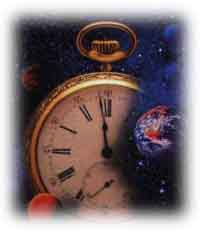
|

|

Jewish World Review / May 19, 1998 / 23 Iyar, 5758
Shoshanna Silcove
AS WE COME TO THE END of our century we are witnessing a new and curious phenomena on the world stage.
World leaders are apologizing for the wrongs done by their predecessors. The Pope recently apologized for the role of the Catholic Church during WWII. President Clinton recently apologized for the American role in slavery. Members of the Australian government are apologizing for oppression of the Aborigines. Even Mayor Rudy Guiliani of New York has jumped on the apology bandwagon. He recently apologized to the Jewish community on behalf of the city for the pogrom of 1991.
Why has it suddenly become fashionable to say, "We're sorry"? Has there ever been a time before in history when powerful world leaders suddenly became so contrite?
The 20th century with all it's dazzling scientific achievements and technological advancements has
been the bloodiest century of all times. The numbers murdered under the Communists and the Fascists are upwards of 50 million combined. America, too, played its part adding another few million murdered in the Indo-China War. Now as we stand on the precipice of a new millenium we look back on many of our wondrous accomplishments and find them to be overshadowed by our worldwide barbarism.
Cynics will say this collective breast beating on the part of world leaders is just another way of gaining mass media appeal.
Perhaps.
Yet, underlying it may be the mood of the times and a growing realization that
mankind must correct itself.
Man's inhumanity to man is not new. It began with Cain and Abel. Psychologists will point to fear as the root cause. Philosophers will blame the tragedy of the human condition. Historians will say the only thing we learn from history is that we never learn from history. Perhaps Voltaire was correct when he described this world as one of total corruption; one that if it were any worse would be hell itself.
Yet, with all this, the human spirit has the ability to correct itself, to repent, to do teshuvah. Behind the mass killings of Communism and Fascism was the commonly held human hope for a better more perfect world. All people instinctively perceive that this world is not all that it can be and that it has potential to improve.
As the wheel of history turns, we find that most of the old ideologies of our century are crumbling.
Communist reformers have dumped that unworkable ideology. Fascism can never again gain mass popular appeal. Moreover, without the Cold War the West is having difficulty finding a new cause celebre. Hence apologies are made for the grave error of the destruction of humans in order to save humankind.
Apologies will never bring back the dead or right the wrongs of history. However, it should be recognized that when the Pope tells his flock that it is the teachings of Christianity itself that helped to bring about the mass murder of innocent Jews, that we are making a huge step towards a redemptive healing process. This is a bold recognition that its religion is flawed and contains an immoral teaching that must be eradicated.
This in turn should be recognized as a significant historical watershed that is redemptive in quality.
In the same vein Glasnost was a self admission of failure. Gorbachev simply realized that Communism could not go on and allowed it to fall under its own weight. We seem to be entering an era when mankind can begin to agree on some sort of universalistic morality without being too proud to admit the shortcomings of particular ideologies and religions.
Yet, with all this breast beating and asking for forgiveness, the main point still seems to be lost. That is this: Where does morality come from? The politically correct doctrine of moral relativism is taught in most universities in the Western world. This doctrine asserts that morality is culturally determined and thereby relative. This no longer has any efficacy. The popular question that is often asked in philosophy classes "If a tree falls in a forest while no one is around does it make a noise?" must be answered with a resounding "Yes!" Objective reality does exist and with it so does objective morality. Otherwise, why be remorseful for our actions?
Furthermore, why be remorseful for the actions of others in the past if not for the ideas of collective guilt and collective responsibility? In addition, where do these ideas come from if not the Torah?
The truths of the Torah are universal truths. Mankind as a whole is coming to a natural realization of these truths without understanding their original source. Hence we witness the growing consciousness that certain things are simply wrong—like cruelty to animals. During the Middle Ages no one questioned the morality of hunting and it was even a popular pastime of the nobility. Likewise, in centuries past people did not question the existence of war; it was considered an accepted part of life and even an honorable endeavor. This has changed within the last thirty years, which has seen an unprecedented mass movement for peace throughout the world. These exemplify the process of self correction the world seems to be undergoing.
However, this redemptive process will remain incomplete until we come to a collective understanding that morality comes from a universalistic higher power. This worldwide recognition of the true nature of G-d is the last stage in a long redemptive process that is unfolding in a natural way before our very eyes. The keen observer cannot fail to discern
 Breast-beating on the world stage
Breast-beating on the world stage

New JWR contributor Shoshanna Silcove is an Australian-based writer.